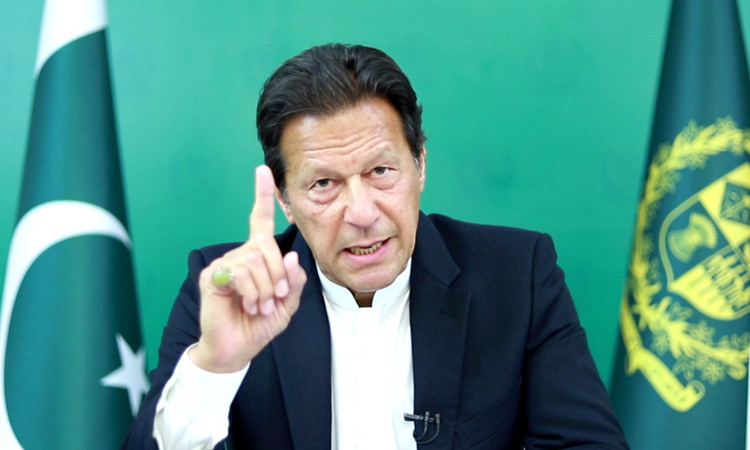Lack of rule of law deprived majority of basic rights, Pakistan PM Imran tells US scholar

Imran Khan says during the interview that he faced several setbacks during 20-year struggle.
"The problem was the elite capture of resources which deprived the majority of proper healthcare, education and justice. Lack of rule of law is the reason why Pakistan had not achieved its potential,” the prime minister said in an exclusive online conversation with Shaykh Hamza Yusuf aired on Sunday.
An American Islamic scholar, Hamza Yusuf, is the president of Zaytuna College and had also authored several encyclopedia entries, academic papers, and articles on Muslim bioethics, legal theory, abortion, and many other topics.
The prime minister said no society could ever achieve its potential if there was no rule of law.
"Merit is also associated with rule of law. If you do not have meritocracy in a society, you have this elite, which is spoiled, rich and which did not strive and struggle and they sit on the main position. Countries disintegrate because of a decadent elite. People do not decay it is the elite that decays,” he remarked.
The prime minister said the fundamental principle of a civilised society was the rule of law where powerful is also equally answerable to the law.
The biggest problem in the developing countries was the absence of rule of law and discriminatory laws for rich and the poor, he explained.
He told the interviewer that he wanted to make Pakistan an Islamic welfare state based on the concept of state of Madinah by our Prophet Muhammad (PBUH).
"We want to base this country on two principles. One it should be a welfare and humane state which takes care of its bottom strata of society and second rule of law,” he remarked.
Talking about climate crisis, he said the environment should be treated as sacred. The biggest environmental disaster in the world called climate change was because human beings had deviated from basic principle of protecting the earth.
Quoting a Hadith of Holy Prophet (PBUH), advising the humans to "Work for this world as if you will live forever and work for the hereafter as if you will die tomorrow,” the prime minister said whatever the humans would do today would ultimately have an impact on the future generations.
He said the Hadith had completely encompassed everything about environment and how one should be living on earth. He said one would have to pursue a humane life if he or she wanted to get close to the Allah Almighty.
Imran said the leadership that came up through the political system was just too divorced from faith so they came in for power and compromised for staying in power and gain personal benefits.
"I find every few politicians coming with the specific objectives of looking after humanity. In most of the developing world they come in power for self-interest and for making money.”
Unfortunately there were very few “Mandelas” who came in for a noble cause. Our great leader Jinnah who was founder of Pakistan, was someone who came for a great cause, Imran noted.
He viewed that the politicians were looked down upon because they say they claimed to help the people but contrarily, they helped themselves, he added.
The prime minister said he came into politics because of his faith. "I had everything. I was already a big name in the country as a sports star and I had enough money. So, for me struggling for 22 years to become the prime minister made no sense. The only reason was I believed that I had a responsibility towards society because I was given more than others,” he added.
He said according to all religions, the human being would be tested based on the benefits and privileges given in life. "I came into politics because I had faith and realised that I was so blessed, so had the responsibility towards society.”
NNI News Service







